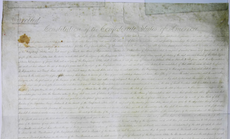Colin J. McRae
Colin J. McRae | |
|---|---|
| Deputy from Alabama to the Provisional Congress of the Confederate States | |
| In office February 4, 1861 – February 17, 1862 | |
| Preceded by | New constituency |
| Succeeded by | Constituency abolished |
| Personal details | |
| Born | Colin John McRae October 22, 1812 Anson County, North Carolina, U.S. |
| Died | February 1877 (aged 64) Puerto de Caballos, British Honduras (present-day Puerto Cortés, Belize) |
| Political party | Democratic |
| Relations | John J. McRae (brother) |
Colin J. McRae (born Colin John McRae; October 22, 1812 – February 1877) was an American politician who had served as a Deputy from Alabama to the Provisional Congress of the Confederate States from 1861 to 1862.[1][2][3]
Biography
[edit]Colin J. McRae was born on October 22, 1812, in Anson County, North Carolina.[4] His brother, John J. McRae, served as the 21st Governor of Mississippi (1854–1857).[1] Before the Civil War, McRae was a merchant from Mobile, Alabama.[1] He co-owned a foundry in Selma, Alabama, which made ammunition and iron plate for gunboats.[5] Some of these gunboats were used during the war.[6]
McRae served as Confederate States Financial Agent in Europe from 1862 to 1865.[1][2][3]
In 1867, McRae moved to Puerto de Caballos, British Honduras (present-day Puerto Cortés, Belize), where he purchased land and ran a plantation and mercantile business centered on mahogany.[1][2] McRae died there in February 1877.[4][7] He bequeathed the plantation and mercantile business to his sister and her husband.[1] They leased the plantation to tenants until 1894.[8] The location of his grave, in Belize, is unknown.[4]
In October 2011, a college student at the University of New Hampshire found relics of his Belize plantation house on an archeological expedition in the middle of the Belize Valley.[2] His records were found in Monterey Place in Mobile, Alabama.[1] They are held at the South Carolina Confederate Relic Room and Military Museum, in Columbia, South Carolina.
See also
[edit]References
[edit]- ^ a b c d e f g The Colin J. McRae Papers, Columbia: South Carolina Confederate Relic Room and Military Museum
- ^ a b c d Wright, Lori (October 2011). "Uncovering History: Student Helps Discover Confederate Soldier's Homestead in Belize". The College Letter: Newsletter of the College of Liberal Arts. Archived from the original on July 19, 2013.
- ^ a b Andrew Lambert, Colin J. McRae, Confederate Financial Agent: Blockade Running in the Trans-Mississippi South as Affected by the Confederate Government's Direct Procurement of European Goods Borderland Smuggling: Patriots, Loyalties and Illicit Trade in the North East, 1783–1820, The International Journal of Nautical Archaeology, August 2009
- ^ a b c The Political Graveyard
- ^ William F. Donnelly, American Economic Growth: The Historic Challenge, Ardent Media, 1973, 152 [1]
- ^ Edwin Layton, Colin J. McRae and the Selma Arsenal, Alabama Review, XVIII (1966), 132-133
- ^ General Officers of the Confederate Army, Officers of the Executive Departments of the Confederate States, Members of the Confederate Congress by States. Neale Publishing Company. 1911. p. 157.
- ^ Donald C. Simmons, Jr., Confederate Settlements in British Honduras, Jefferson, North Carolina: McFarland & Company, 2001, p. 91 [2]
Further reading
[edit]- Charles S. Davis, Colin J. McRae: Confederate Financial Agent (Tuscaloosa, Alabama: Confederate Publishing, 1961).
- Ray J. Fletcher, Colin J. McRae, Confederate Agent in Europe (Tallahassee, Florida: Florida State University Press, 1956).
External links
[edit]- 1812 births
- 1877 deaths
- 19th-century American politicians
- American emigrants to Belize
- 19th-century American merchants
- Confederate expatriates
- Deputies and delegates to the Provisional Congress of the Confederate States
- People from Anson County, North Carolina
- People of Alabama in the American Civil War
- Signers of the Confederate States Constitution
- Signers of the Provisional Constitution of the Confederate States
- 19th-century American businesspeople

